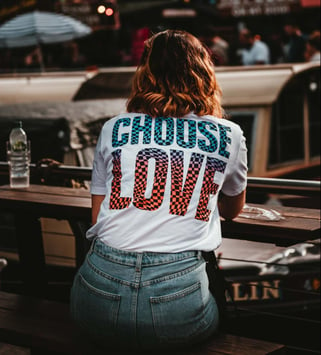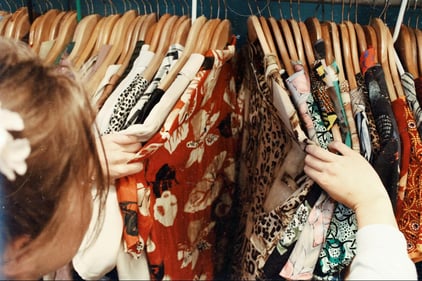It’s the run-up to exam season and Gen Z has plenty of stress factors to juggle. That means students are...
Fashion brands only have 8 seconds to engage Gen Z. A new report explains exactly how to get their attention and money, using their shopping habits and values.
Apps like TikTok and Instagram have been at the centre of recent trends, with the latest comeback being those nostalgic Y2K vibes. The content from these apps have such a strong influence on our fashion today, that even ‘tramp stamp’ tattoos are making an unexpected comeback.
The users driving the content behind these apps are primarily Gen Z. They may be young, but they are a driving force of trend setters.
And when it comes to the fashion industry, not only are they confident in their decisions, they want to stand out with their own distinctive style.
So as fashion changes, and shifts to past trends and new fads, Gen Z is at its core.
But, as forward thinking as they are, Gen Z are a difficult customer to capture, so how can fashion brands appeal to them?
 Fashion is changing in all aspects and Gen Z is at its core.
Fashion is changing in all aspects and Gen Z is at its core.
Their eight second attention spans leave brands nearly no time to capture their interest - and compared to the 12 second attention span of millennials, it can be tough to adapt.
Messages should be simple and direct, and if successful, brands will be able to appeal to over 40% of total consumers, and the financial elements will pay off.
They may have some interesting styles, but Gen Z are the biggest generation globally, and their spending power amounts to $3 trillion every year.
We wanted to discover more about such a powerful force in such a huge industry, so we spoke with a panel of our 20m+ verified student members. Asking them for their opinions on all things fashion, in a series of surveys and polls.
Over 18,000 Gen Z students provided insights about their relationships with their devices, platforms, fashion favourites and retail habits.
Their responses revealed passionate feelings towards clean-washing, conversation commerce, brand intrusion, third gender marketing and lack of trust when shopping through new social media checkout features.
Gen Z’s fashion choices might stand out from the crowd, but they earned that by going against the grain and making bold choices, revealed by the 56% who said they do not follow fashion trends.
But whilst they’re not choosing to follow trends, the choices they do make have a huge impact on how they feel.
From shoes to accessories and even lingerie - the report reveals that fabulous clothes are making 96% Gen Z feel confident, and that 87% of Gen Z agree that great clothes make them feel sexy.
But whilst these clothes provide a boost to their self esteem, 79% state that sustainable fashion is still incredibly important to them.
Of course, Gen Z weren’t the only generation who lived in sweatpants and baggy jumpers throughout the pandemic. But the report reveals that 76% of Gen Z are looking forward to partying again, and 64% are expecting to spend more of their cash on outfits for events.
In fact, thanks to the easing of lockdown restrictions, 78% said they’re planning to dress up for parties, and 54% will be spending their money on beauty.
But it’s not all about partying. The report found that 66% of Gen Z are intending on spending more money on clothes when they start, or go back to university.
Given their affinity for technology and online spaces, it’s easy to anticipate that Gen Z will only buy clothes online.
Whilst there is some truth to that, the survey showed that the majority are actually looking forward to browsing the shops in person - with 84% saying so.
Of course, that doesn’t mean that social media and online shopping will be left behind. Fashion brands still need to be creating content that feels genuine to the environment and relative to ongoing discussions - or they’ll lose Gen Z’s attention.
But if fashion brands look to social commerce and incorporate it into a part of their wider omnichannel retail strategy, their hard work will pay off.
Three quarters of Gen Z are used to buying clothes solely online, especially due to lockdowns, and apps like TikTok and Instagram aren’t going anywhere. But there are still key elements to include in a brand’s advertising if they want Gen Z’s attention, and their money.

We know that Gen Z are a force to be reckoned with, and their online behaviours are what drive many advertising campaigns. But fashion brands aren’t limited to social media when trying to appeal to these shoppers.
85% of UNiDAYS members highlighted that no matter what, they will research online before committing to a purchase - so if a brand’s reviews are lacking, their online engagement will struggle to reach its targets.
Not every company can offer hugely discounted products, but for Gen Z, that’s what they’ve trained their eye for.
The report showed that 95% always keep an eye out for a bargain or offer, and 82% are loyal to brands that offer regular discounts.
And once they’ve decided on a place to shop, over half appreciate being able to do so with their peers, as 53% said that shopping is a social experience shared with their friends.
Unwanted ads have become a real source of contention for internet users. No one wants to feel like they’re being inundated with attempts to take their cash - but Gen Z aren’t as bothered.
The report revealed that just under half (49%) of Gen Z don’t mind brands advertising to them on social media so long as it’s relevant to them.
However, the survey found that 76% of Gen Z would not be happy if these ads appeared in their conversations, and would object to them popping up in their instant messaging streams.
So if a brand can cast their aim to their target correctly, they’re less likely to get a swift block.
The report showed that TikTok is home to the most Gen Z users with 39%, whilst Instagram came in second with 37%. Facebook is host to 10%, Snapchat 9% and Twitter 5%.
Brand ads on social media apps may direct them to shop a latest collection, but half of Gen Z (56%) say they don’t follow fashion brands on social media - so any updates are likely to be missed.
Brands creating Instagram and TikTok content and those collaborating with influencers should be cautious.
90% of Gen Z believe it should be illegal for influencers to use unlabelled and retouched images, while 93% believe social media promotes unrealistic life and body goals
If a brand manages to capture their attention, using social media to make purchases isn’t always Gen Z’s go to option. The report showed that even though 85% research online first, 75% don’t trust shopping directly on social media.
That hasn’t stopped social media companies from trying out new ways to make purchases on their platforms.
While the Instagram checkout feature is still being tested, companies can still set up brand pages and tag items in their posts. These then can click through to the relevant page of the company’s website, or users can click the save button to build a wishlist for buying later.
Gen Z may be leading the way with their daring fashion choices - but they’re still concerned about where their clothes come from and the impact they have on the planet.
However, the report found that despite 59% considering themselves ‘woke’, one in four Gen Z shoppers don’t know where their clothes are manufactured.
But manufacturing location isn’t the only harmful factor Gen Z is taking into consideration.
As a result, the survey found that 79% of Gen Z agree that sustainable fashion is incredibly important to them, leading 68% wanting their clothes to be manufactured to the highest ethical standards. 39% would even buy pre-loved clothes thanks to their sustainable nature.
And they’re happy to save money in the process too. A third often pick up recycled items thanks to the cheaper price tag.

What’s a good outfit if the makeup and hair doesn’t match? Gen Z knows the importance of good skincare - but they’re not just looking for the basic standard anymore.
The report showed that Gen Z prefers keeping it clean and natural, with 88% saying so in the report.
However, they won’t just take your word for it.
The survey revealed that a third will always read the ingredients label before making a purchase - and for those who didn’t, 78% will return the product due to what the products contain.
And this isn’t likely to change, after 86% said that they believe all beauty brands should become all-natural over the next decade.
Leading the discourse online, Gen Z have been front and centre of some of the world’s most heavily politicised human rights issues.
And if brands think that these conversations stop online - they’d be mistaken.
43% of Gen Z say that they believe gender doesn’t play a role in choosing clothes, and in fact - 79% said they’re not put off buying clothes that are marketed to the opposite gender.
Language is key too, as 23% said they think gendered language in stores is outdated or offensive. So, if a brand is wanting to win the loyalty of Gen Z - it’s time to do some research.
Luxury brands seem to be struggling in their quest to engage Gen Z in the fashion they produce - shown by the 71% who don’t feel they relate to the brands.
But that doesn’t mean the more upmarket styles can’t capture their interest, as the report showed a solid foundation they can build upon.
Just under a third (32%) of Gen Z follow designers, and 40% say they have an eye for limited edition pieces. Appealing to Gen Z’s preference for standing out is probably where luxury brands have an advantage over their cheaper competitors - as not everyone can get their hands on their products.
In fact, 47% said that design is their top consideration when buying luxury fashion.
And just because Gen Z looks for cheaper options, doesn’t rule them out completely. 47% said they buy luxury clothing as a treat, and 27% make their purchase thanks to the quality of the clothing.
So much so, that 30% have bought one to two pieces of designer clothing this year, and half have been buying more fashion in 2021 than they ever have before.
Gen Z has never been an easy customer to appeal to. They find it difficult to part with their cash, and scrutinise elements of brands that have rarely been spoken about before.
Then, factoring in that their focus on specific fashion trends changes at lightning speed - fashion brands may feel like they have no chance.
But it’s clear.
Keeping up with the most recent trends and predicting what such a fast changing industry and generation will love next is all up to the experts.
However, what some brands may not be used to doing could be more difficult to implement and will be more than likely to pay off. Being transparent about intentions and values, and having an ethical and eco-friendly approach to manufacturing will instantly win a brand their coveted Gen Z points.
276 5th Ave, New York, NY 10001